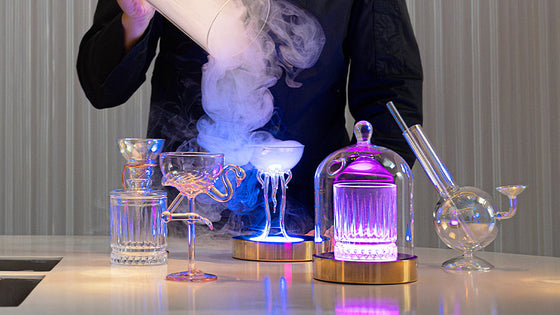How Flavour Develops in Barrel Aged Spirits and How to Pair those Flavours in Cocktails.
Several factors affect the flavour of spirits that are sold as aged. Usually, ageing happens in barrels. They are not airtight, they are porous, and they're positively brimming with their own set of unique flavour compounds. Distilleries are often looking for new barrel and spirit pairings. They have experimented with charring, different woods, used barrels from other industries like sherry or port, and ageing in different environments. For example, rotating barrels around warehouses, messing with storage temperatures, even taking barrels out to sea on a worldwide boat trip, or forging them under ultrasonic sound waves. But ageing doesn't happen neatly. Organic compounds are volatile and can change even when stored in the shop-ready bottle.
Chemical Reactions in Maturation
Your spirit is a collection of flavours made by the original material, the fermentation, the still and the distiller, and any additives once the spirit is ready to mature. The main factors that affect ageing are; temperature, light, interplay with the air, and interplay with the storage vessel. The most notable effects on taste are the contact the spirit has with other chemicals and the concentration rate. The maturation process is how these all interact.

Contact During Maturation
Barrel ageing happens in three stages.
- The harshness of the young alcohol mellows as overbearing high ester flavour compounds are the first to evaporate away. The first layer of wood interacts with the spirit. This is usually the charred innards, so the spirit adopts caramel, smoke and a resin-like flavours.
- The spirit continues to evaporate, and lighter notes are lost — these can include green grassy scents, floral or medicinal flavours. The spirit moves further into the wood with each temperature contraction (where the cells huddle in the cold and expand in heat). If the wood is oak, which it often is, oaky compounds develop flavours like vanillin and lactones — the latter being a green coconut kind of taste. European oak adds dried fruits, spices like clove or incense and American oak gives more vanilla, coconut and cocoa.
- With serious time in the barrel, a third wave of aromas and flavours contribute to the taste. These are the unctuous, subtle notes of mushrooms, cheese, and wet leaves.
If you want a spirit to get to stage three, that spirit better have some serious stand-alone qualities, or the wood will totally take over. The aim in all distilleries is to find balance and harmony between the liquid off their stills and the vessel they have chosen to house it.
The Rate of Contraction
How quickly these three stages pass through is changed by the contraction rate. Both the warehouse environment and the barrel affect that rate. The spirit contracts when it gets cold and expands when it heats up. Over time, this movement creates liquid loss, namely evaporation of the ‘angel's share' which concentrates the flavour compounds in the leftover spirit. It's a slow reduction.
- Roughly spirits tend to evaporate more quickly in their youth. In the UK, the evaporation rate ranges from 2% to 4%.
- As time goes on and the amount of liquid in the barrel reduces, the rate of evaporation will slow down. Throughout its life in a barrel, a 20-year-old spirit aged in Scotland might lose 40% of the total volume.
- Liquids stored in smaller casks will evaporate more quickly because of increased liquid-to-wood contact. Because the wood is in touch with the air, more angel’s share is lost.
- The climate the barrels are kept in will also affect the speed of maturation. For example, two whiskeys made precisely the same way and placed in exactly the same type of oak barrel will mature at different rates if one is warehoused in Scotland and another in India.
- Likewise, if your warehouse is hotter towards this ceiling and cooler on the floor, the barrels at the base of the stack will evaporate slower than those at the top.
- The humidity in the air affects evaporation too. For example, Bourbon aged in muggy Kentucky gets almost an equal amount of water and alcohol leaving the cask at once. In contrast, a whisky aged in a maritime climate will lose more alcohol and less water.
- Airflow also has a significant impact. If a barrel is stored on a rack that separates the stacks of casks, then air can circulate around them. The more airflow, the broader range of temperatures, and therefore, the higher the rate of contraction and expansion. Ventilation, wind, rain, humidity and changes in atmospheric pressure will change how alcohol vapours accumulate around the barrels.

Flavour Compounds Found in Aged Spirits
|
No Age |
Young Age |
Middle Age |
Old Age |
|
Esters
Green apple Solvent Soap Pear drops |
Woody
Caramel Smokey Medicinal (iodine, root beer, TCP) |
Woody
Leather Tobacco Waxy |
Woody
Spicy (hot, chilli) Wood spices (cinnamon, clove, allspice) |
|
Floral
Natural (roses, violets) Perfume (potpourri, incense) Soapy |
Cereal
Malty Toast Beer |
Nutty
Marzipan Cocoa Nuts (hazelnut, walnut etc) |
Fatty
Chocolate Coconut Butter Cheese |
|
Green
Vegetables (peas,cabbage)
Grass (lemongrass, cut grass)
Herbal (chives, coriander) |
Sweet
Vanilla Honey Treacle |
Fruit
Pitted Fruit (plums, apricots) Dried Fruits (raisins, candied peel) |
Fruit
Tropical fruit (pineapple, papaya, lychee) Pungent berries or roots (coffee, ginger) |
|
|
|
|
Meaty
Mushroom Marmite/Bovril Red meat (blood) Wet leaves |
Flavour Blaster Aromas to Try with Aged Spirits
Light aromas pair well with younger spirits. They tend to be oily, grassy, herbal and floral. Try:
- Lavender
- Lemongrass
- Citrus
- Bergamot
The roundness of younger aged spirits works well with many aromas. Try cutting through the sweetness with a spicy or jammy aroma.
- Smoke
- Mixed Berry
- Elderberry
- Cinnamon
There's a lot more influence from the wood in middle-aged spirits. Try pairing these woody tones with woodland aromas, or tart, fragrant fruits and spices.
- Rosemary
- Nutmeg
- Grapefruit
- Neutral
The new flavours that develop in much older spirits are much more savoury. Fatty flavours like butter, cream or coconut come forward, and umami develops too. Try pairing these unusual and complex flavours with tropical fruit flavours and pungent scents like coffee or ginger.
- Passion Fruit
- Ginger
- Coffee
- Neutral
Try working out where a three year old rum barrel-aged in the Caribbean compares in maturation to a three year old Scotch whisky. Find out where you think they sit on the spectrum of developing flavours. Not all age statements equal the same flavour profile, which is why there are so many variants to try. Try out aroma pairings and let us know what you think works!
















